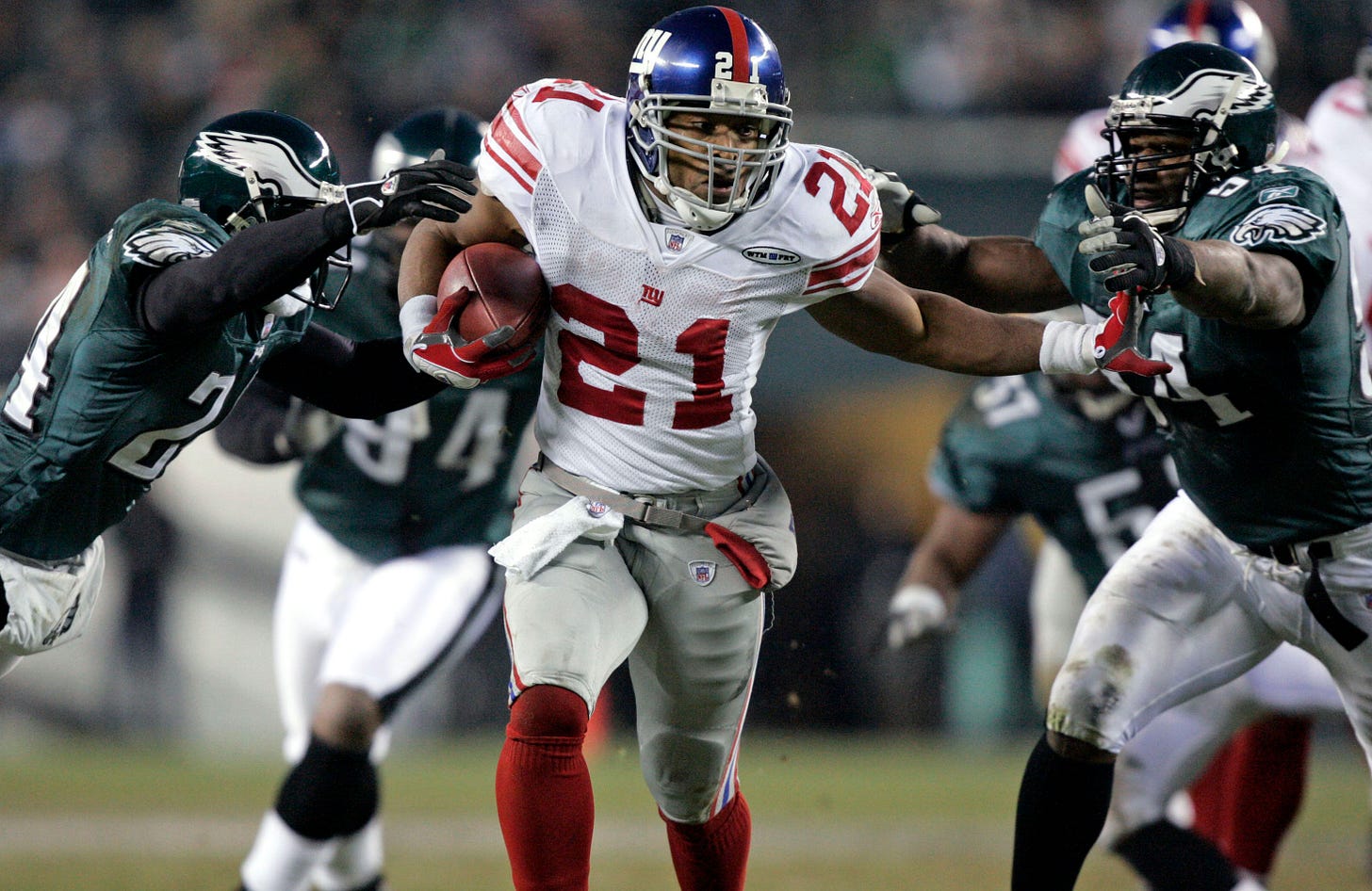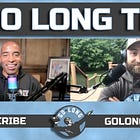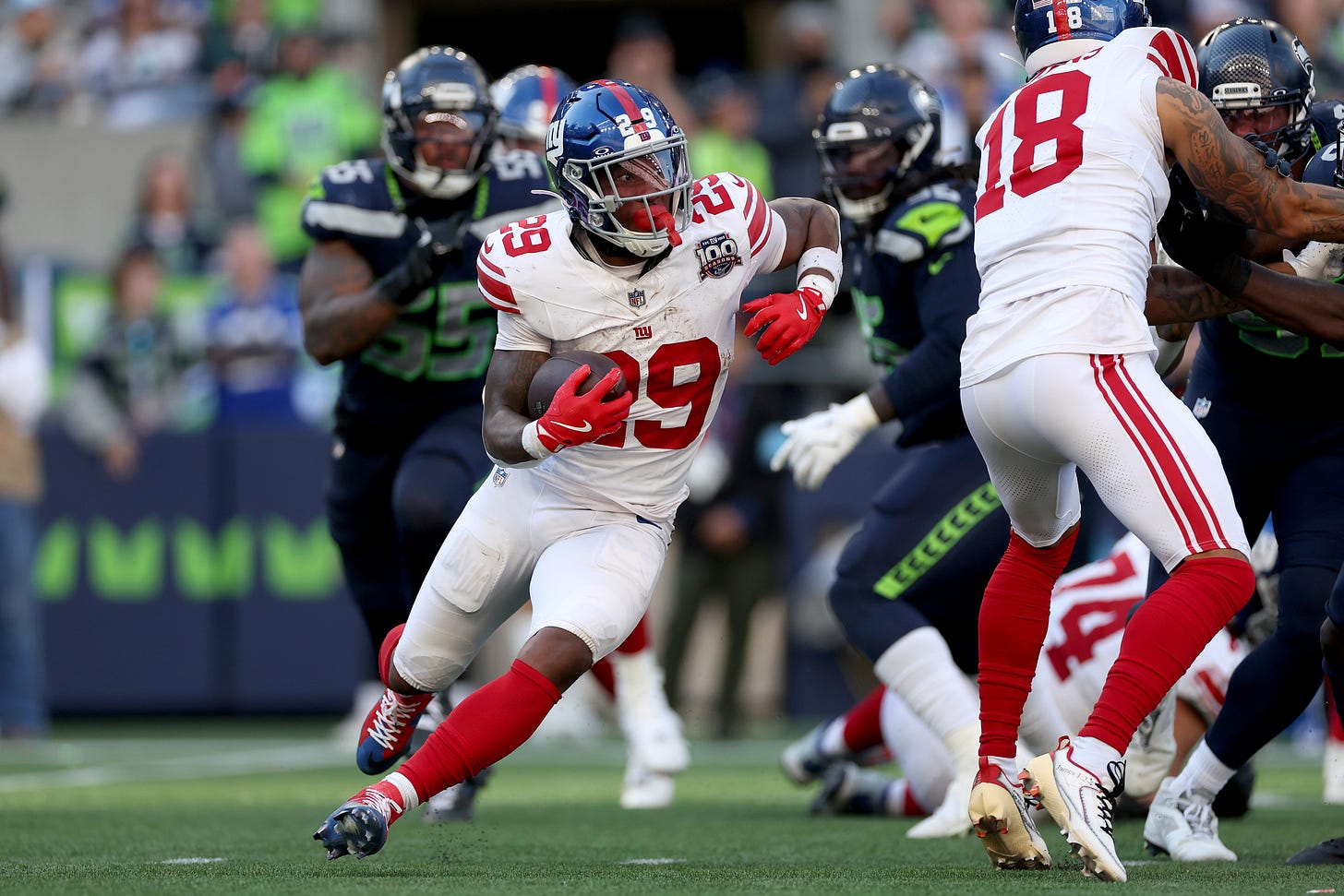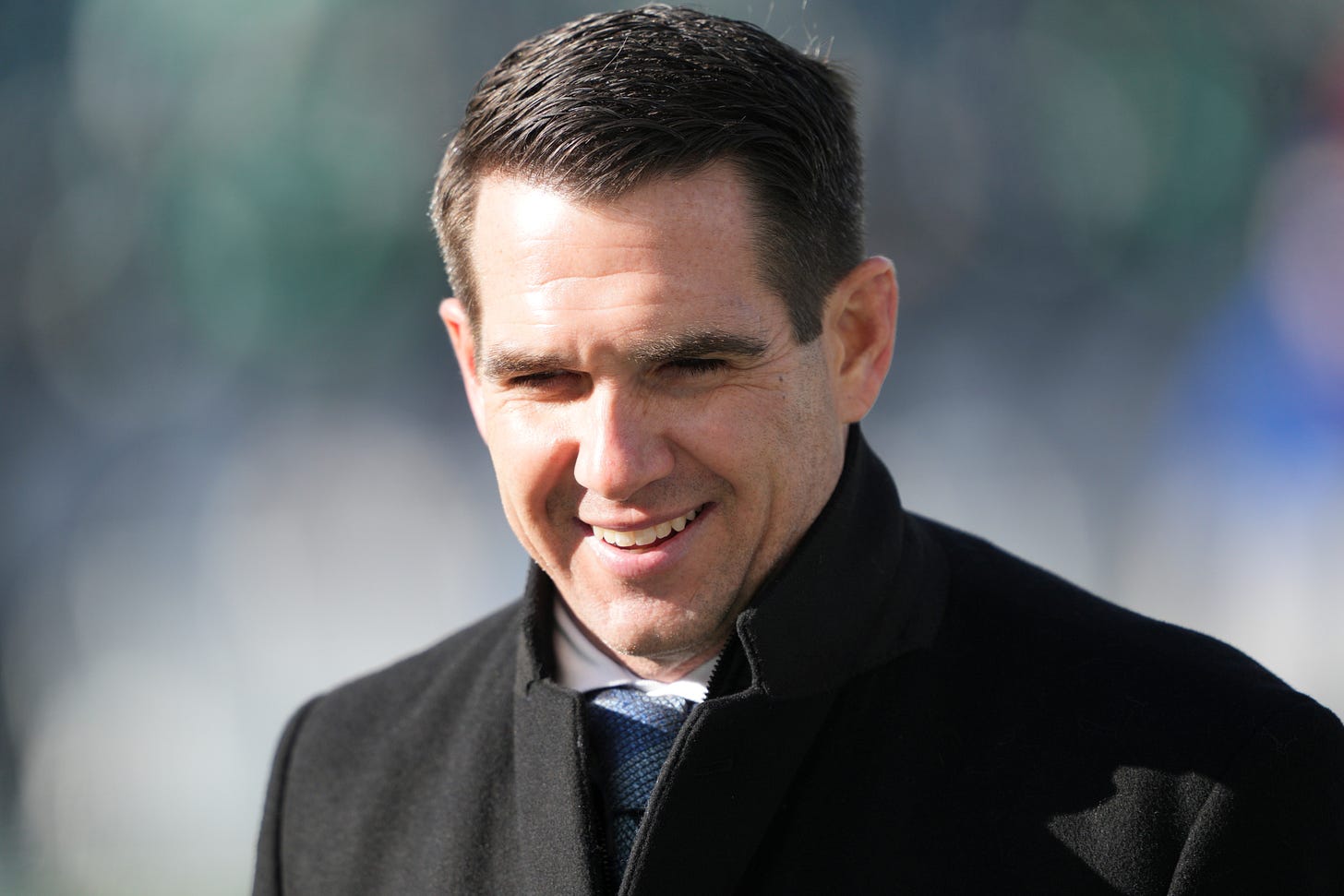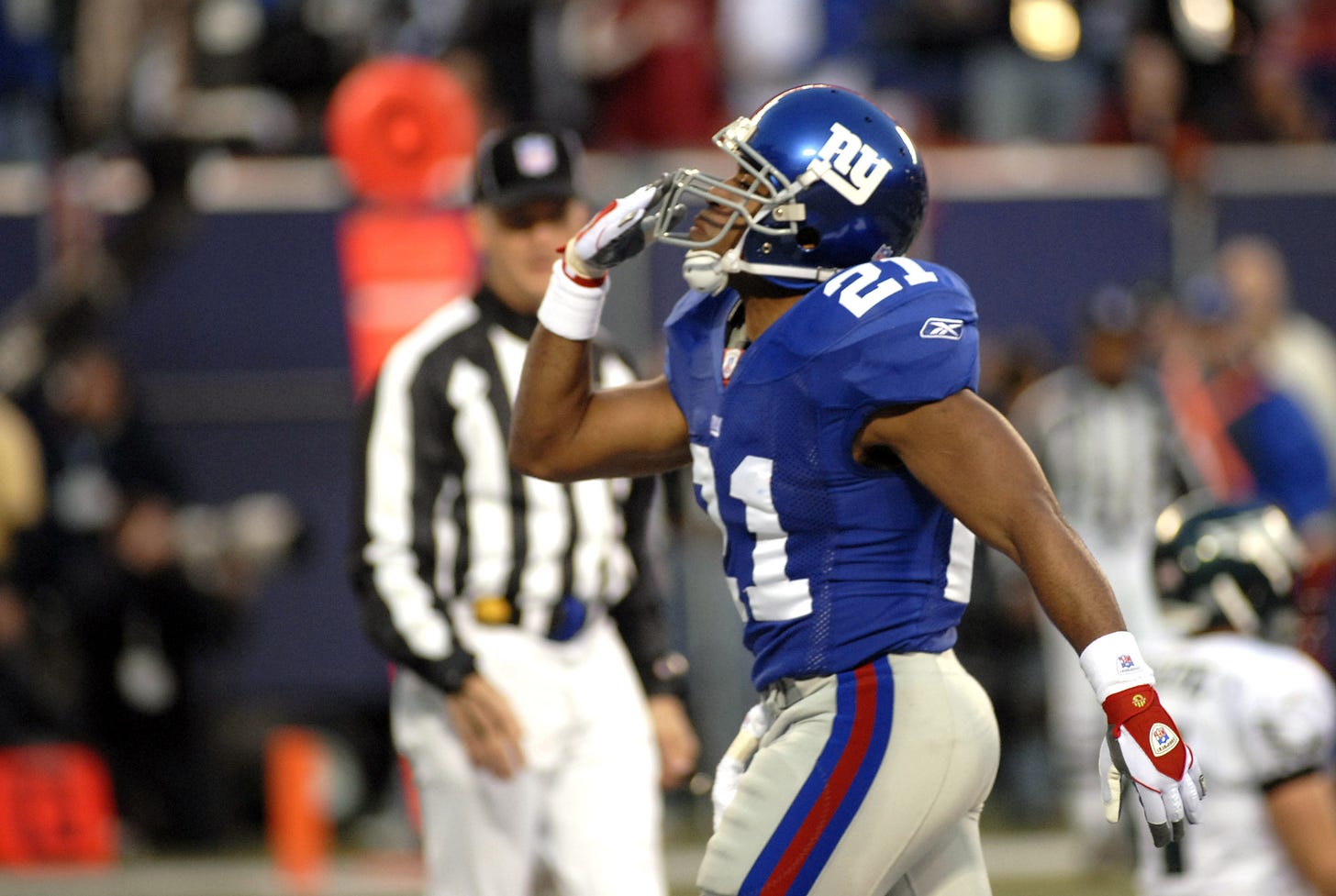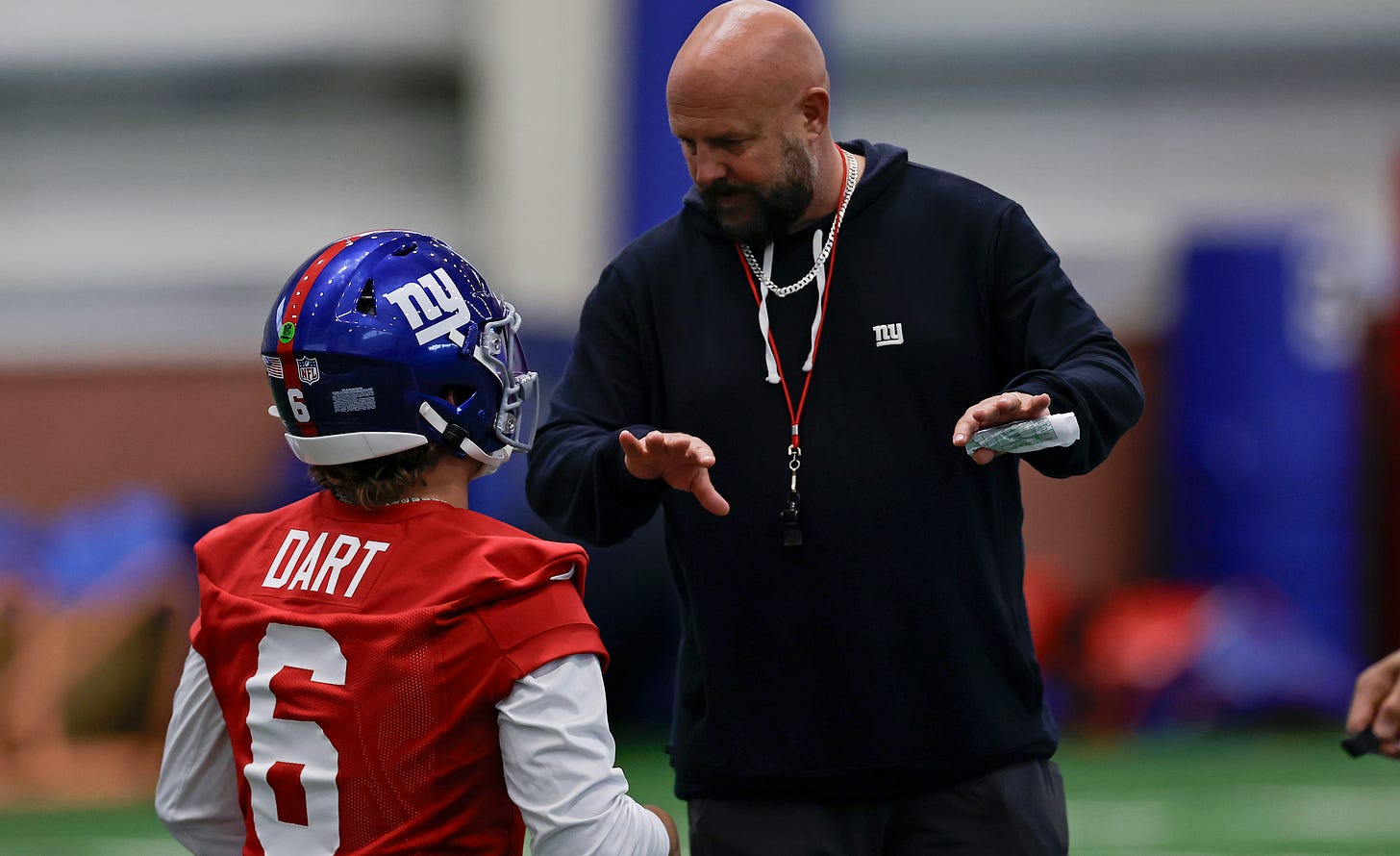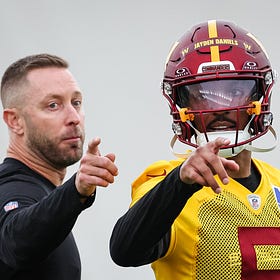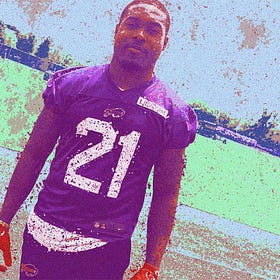'It feels Old School Giants:' Tiki Barber sees a gleam of light
Last season was ugly. "Unwatchable" at times, says the team's all-time leading rusher. But a strong offseason is giving Tiki Barber hope for his team's future. Here's our full convo.
Good morn! It’s always a good time to check in with Tiki Barber, the New York Giants’ all-time leader rusher. We’ve relived his career in the past.
With this team facing such a critical 2025 season, we stick to the Giants of today this chat.
He’s optimistic. He sees an identity forming. We dig into everything Saquon Barkley, Daniel Jones, Jaxson Dart, Tyrone Tracy, Brian Daboll and Joe Schoen.
The full transcript is below.
Audio and video of our conversation is right here, icymi:
Dunne: One of the all-time greats who should be in Canton, by the way. Tiki Barber, New York Giants legend. You’ve heard him here before on the Go Long Pod. We got into your life, your career, some of those old war stories with Tom Coughlin and the gang. How in the hell have you been?
Barber: I’ve been good. People always mention the Hall of Fame and I say to them all the time — at some point they’re going to like running backs again. At some point, it’ll be OK. But right now they kind of just haven’t put a running back in about seven, eight years.
Dunne: You’re right. Who was the last running back to get in?
Barber: Edgerrin James was the last one that got in. The last one that was discussed was Fred Taylor over the last couple of years, but he just keeps falling short. Now, it’s inevitable because Adrian Peterson is going to be up this year or maybe next year. So he’s certainly going in again. So hopefully that starts the flood again to get running backs back into the Hall of Fame.
Dunne: It’s the glory position. It’s what everybody grows up on, and there was a period of time where you did it better than anybody. It’s about greatness, right?
Barber: I appreciate that. So I was over at Giants camp last week and got a chance to talk to the team, but also pulled aside the running backs. Obviously Tyrone Tracy, who I’ve known for a year now, and then Cam (Skattebo) and Eric Gray and those guys. And so one of the things that I said to ‘em was “They say it’s a passing game these days and it’s all about the quarterback and the wide receivers, but you know who they really come to see. They come to see running backs. And when you rip off a 30-yarder or a 70-yarder, there’s nothing more electrifying to any NFL football game than seeing that. So remember that.”
Dunne: And it starts early. I blast the NFL Films music in the basement, give the little football to Sonny Dunne and he’s running all over the place, bashing into the wall. When you first pick up a football, you dream of jukin’ and running people over and spinnin.’ The creativity that the position allows is unlike anything in sports.
Barber: I agree. It’s the easiest way to get going forward. You don't have to worry about a quarterback making a transition to the wide receiver downfield. It’s just turn around, hand it off, hope for those five guys up front to do their jobs well enough to create some space and then go be backyard football. So I agree with you.
Dunne: How were those conversations with Tyrone Tracy, Eric Gray and Cam Skattebo out at East Rutherford? What did you learn about this crew?
Barber: I didn’t spend too much time with them. And Devin is their veteran. Devin Singletary. Motor’s been around for a minute and I think he’s a good presence in that room, but I didn’t talk to them for a long time. What I’ve seen from them is impressive and it’s something to build on from last year. Tyrone Tracy played mostly wide receiver in college and then switched his last year. It’s really like his third year playing running back. He’s got an instinct that’s impressive and it’s really not anything that you wouldn’t expect from a running back. But he’s got this patience that young backs usually don’t have. I remember when I was a rookie — and really into my second and third year — the only thing I wanted to do was get to the point of attack as quickly as possible and just hope that it would open up. And it took me a couple of years to figure out that I need to wait for this. I need to realize that those five guys up front, those offensive lineman, guards, tackles, whatever the scheme is, are sorting it out themselves and I have to wait for them to do their jobs before I can do my job. And Tyrone had that from jump and I think it really showcased itself in that Seattle game early in the season — one that I happened to be calling for CBS — and the way he set himself into the hole, made the defender commit one way or the other and then went to the outside, cut it out the back door and had a couple of big runs was impressive. And you saw it throughout the season.
Dunne: How hard is that as a young running back? I can’t imagine. You’ve been dying for this opportunity. You’re living the dream. You’re playing in front of 70,000 people in a stadium. Millions at home. You get the ball, you just want to go. I imagine you just want to slam that gas pedal. That instinct, how rare is that to have what Tyrone Tracy possesses?
Barber: Well, I think it’s an instinct, but it’s also a fear. We never talk about it in football. You don’t want to get hit. You want to avoid contact at all times. Now it’s not because you’re scared of contact — you’re just more likely to get positive, plus yardage if you don’t get hit. And so there’s this primal fear, subtle fear that you want to avoid contact. And so, the reason I think young running backs get quick is because of that. They feel it coming because it happens so fast in the NFL. It’s not ‘this guy has no idea what he’s doing coming off that side. This guy is lost or he's getting mauled by the guard or the center or whatever it may be.’ Everybody is good and everybody is fast, and so you feel the pressure and so to be calm in that pressure-filled environment takes a lot of patience and a lot of above the X's and O’s thinking. And I think Tyrone instinctually has that. Now with Cam, I don’t know yet. But what I’ve seen from him in college is that he’s like a Tasmanian devil. He’s not overly big. He’s probably 5-11, maybe he’s like 215 or so, Maybe 220. I know he gets presented as a power back, but I don’t think that’s going to be his forte. He can run hard, but if he’s going to try to make a living running over 235-pound linebackers, he’s going to have a short career. But I see them as interchangeable with different types of fire. Different types of energy. And I think it’s what Joe Schoen had in mind when he started looking at this running back group. Not just this year, but a couple of years ago.
Dunne: We were in agreement that this was a team that wasn’t in position to just throw wads of cash at Saquon Barkley. Everybody’s laughing now. He’s a Super Bowl champion. He was unbelievable. He would’ve set the rushing record if he played that last game. And you’ve said many nice things about Saquon, even though there was that whole Twitter…
Barber: It was just a radio bit.
Dunne: And he kind of took that out of context. But anyways, you’ve been very nice when it comes to Saquon. In retrospect, what kind of sense do you make of the Giants’ plan at running back now that the dust has settled, they used that money elsewhere and you’ve got the room that you just detailed. Was it the right move?
Barber: Well, I mean in retrospect it was the right move for Saquon for sure. Because you can’t have an elite run game — with an elite running back obviously — unless your offensive line is put together and it’s got continuity, consistency. And I think most importantly, competency. I think it’s the one thing that the Giants have lacked consistently over the last couple of years is those three things with the offensive line. And Saquon would not have thrived here. I know I kept hearing when he was a younger player: “Saquon is great! Saquon is great!” He might have the potential to be great, but in actuality he was never really great here and it wasn’t all his fault. He had a couple of really good seasons. But if you want to see Saquon and Greatness in the same sentence, watch what he did with the Philadelphia Eagles last season. And I don’t mean just go look at his statistics because that’s easy to do, but you go watch some of those games, break down some of that film and the different schemes that Kellen Moore was using and the advantages that he was creating because of the athlete he had at running back — but also the four Pro Bowlers/All Pro on that offensive line and Mekhi Becton was the only one that wasn’t honored and he had a hell of a season at right Guard last year? That’s how you get greatness from your run game. And it wasn’t a surprise that they rushed for 2,000 yards and ultimately carried with their run game, and that includes their quarterback obviously, Jalen Hurts to a Super Bowl, right? I mean they dominated the dynastic team in the NFL in the Kansas City Chiefs and so much of it was because of the trenches both offensively and defensively.
To me, that’s a lesson for this league. Because so much in this league we talk about, “You got to have a quarterback. You got to have the guy that’s going to be a Hall of Famer. You got to have the Pat Mahomes of the world or the Josh Allens of the world.” Well, I don’t think that Jalen Hurts is yet Hall of Fame quarterback. Maybe he’s going to redefine what a Hall of Fame quarterback is because right now what we think we want in a Hall of Fame quarterback is a guy who throws for 4,500 yards, who completes 70 percent of his passes, is just this consummate playmaker and gets his team out of trouble and does it all by himself seemingly. But I think what the Eagles have created is this team juggernaut. As much as I hate to admit it, it’s entertaining to watch. They’re a nemesis. But I’m like, “Damnit! They did it right!”
Dunne: You could talk to any general manager in the NFL and they say, “You know what? We couldn’t do this at wide receiver or we couldn’t make that move for a pass rusher because we’re paying the quarterback.” And then, here’s the Eagles. They just pay AJ Brown, Devonta Smith, Jalen Hurts, Lane Johnson. The second that one of their studs is up for a contract — and they believe in that stud — they pay him because the market’s only going to keep soaring. They keep drafting well. It’s such a well-oiled machine.
Barber: I give Howie Roseman so much credit and I’ve had a couple of conversations with him over the years. He sees it. He sees the big picture and he’s not worried about the fallacy of the salary cap. And what I mean by that, it’s fungible. You can play with the cap. If you want to sign somebody, you’re going to sign somebody. If you want to let a guy go because he’s a “cap casualty,” it’s really because you didn’t want him. It’s an excuse. It’s an excuse for the agent, it’s an excuse for the player. Maybe it’s an excuse for the fan base. But if you want to create space to sign a great player, you can do it. And the Eagles are an example of it. Now, they’re kicking a lot of that money down the line with these void years and eventually it’s all going to come to roost.
But if you think about where they’ve been in the last seven, eight years. Going back to their first Super Bowl? So they’ve won two Super Bowls, right? Three Super Bowls they’ve been to, they’ve won two of them and the one that they lost, Jalen Hurts was probably the MVP on a losing team. And so they’ve done something right and it’s been almost a decade. And so, say it’s “manipulating” whatever. It’s the right way to create a winning franchise. Because all you’ve got to do is win one. When you win one, it justifies every move that you’ve done. It’s the same thing in baseball. I remember the Mookie Betts trade. Maybe it was five, six years ago. I remember we talked to one of the beat writers out there and we’re like, “How does this make sense to give Mookie Betts all that money?” It makes sense when you think forward. How does it make sense to give Shohei Ohtani all that money or whoever. And the answer that the beat reporter told us was, “Well, if they win a championship, it’s all worth it.” And in 2020, Mookie Betts won a championship in 2024. Last year, the Los Angeles Dodgers won a championship. So it’s all worth it when you win a championship. It pays for itself. And so, the Eagles have paid for their financial expenditures out into the future because they’ve won a championship.
Dunne: And of course Jalen Carter falls to you at nine.
Barber: Of course. What else would you expect? He has a good process: draft SEC football players.
Dunne: Georgia.
Barber: From the best schools. From the teams that are competing for and winning championships, draft those guys. And it works. It sounds simple, but it’s football.
Dunne: It’s the cash/cap thing and being willing to pay that money down the road. It’s identifying early this player we drafted is a stud. Let’s pay him. It’s the Tennessee Titans. They didn’t want to go all-in on the Ryan Tannehill/Taylor Lewan/Derrick Henry/AJ Brown core. So the Eagles go, “OK, we'll give you a first-round pick for AJ Brown.” It’s this whole combination. So back to the Giants. If you’re the New York Giants — not only are you chasing the champs, you’ve got to deal with Jayden Daniels and the Washington Commanders. You still have to deal with the Cowboys. We can laugh at Jerry Jones all we want. They’ve got some talent on offense. What I love about what Joe Schoen and Brian Daboll did though — with this draft and last year’s draft — is they just got some nasty, violent players. The DNA of the team is changing. Cam Skattebo is running into the telephone poles. Abdul Carter wants to wear 56. Jaxson Dart has that fiery personality that aligns with Brian Dabell a hell of a lot better than Daniel Jones did. So is that the approach here the Giants are taking?
Barber: Yeah, and I think that was probably a lot of the conversation with John Mara this offseason or probably the end of last season and into the offseason: Show us the plan. Create an identity. And I think for the last year and a half or so — because I think they did have an identity Dabes’ first year. You saw it. It was “We’re going to be tough. We’re going to be mistake-free.” Remember the screaming at Daniel Jones when he through that interception in Week 1? And it was simple. I asked Dabes: “What did you say to him?” He said, “Make better bleeping decisions.” And so Daniel Jones led the league in turnover percentage that year. It was 1.1, it was tied with Jalen Hurts for the lowest turnover percentage in the league. And it was clear. It was coaching that got them to that point. And so we knew that they were going to play games tight and hope that one of their “stars” — whether it was Julian Love, whether it was Saquon, whether it was Daniel Jones, whoever — was going to make a play in the fourth quarter that would get them a victory. And it worked for them. They got to the postseason. They beat the Minnesota Vikings. Dabes won coach of the year. It was a great stepping stone. The problem is, the plan fell apart in the subsequent two years. And a lot of that was because of injuries. Maybe some of it was Dabes overextending himself in taking over playcalling duties from Mike Kafka. And so they lost themselves in those two years and it became a really unwatchable product. I called a couple of those games and it was just like, “What am I even looking at right now?”
And so I think this offseason it was, “We have to get back to a plan and create an identity.” And so much of that starts on the defensive side of the ball. And you saw it right in free agency bringing in Jevon Holland and maybe more importantly Paulson Adebo who is a big corner. When I was out at practice, I saw him working out on the side because he was recovering from that leg injury and I was like, “That dude looks like a tight end or a running back.” And he’s a cornerback. He’s jacked. You can see the musculature in his body. And so we know that it’s going to be aggressive up front. Obviously Sexy Dexy is back and then there’s Darius Alexander. All those guys that they’ve brought in. It’s going to be about stuffing the front. You draft Abdul Carter. You have Thibodeaux and obviously you have Burns. And so now maybe you can get into that race-car package. Remember that from the Giants in the mid-2000 years when they had those 3D ends on the defensive line all at the same time on rushing situations? So I think it’s to create a tough, versatile defense and limit offensive possessions for the other team. And then let’s go make some big plays on the other side. It’s why you get Malik Nabers a year ago. It’s why you bring in Russell Wilson. As odd as a signing that might seem, the one thing that Russ has done consistently over his entire career — even if some of the things he says are corny — on the football field he makes big plays. You see it every single year. Now, he may not be as consistent and mobile as he used to be, but he makes big plays and he’s here to win games for them. So I see what they’re attempting to do identity-wise and it starts old school: “We’re going to run the football. We’re going to take some shots. And we’re going to play great frickin’ defense. It feels Old School Giants in a way, and I kind of love that.
Dunne: Yeah, and it wouldn’t hurt if Andrew Thomas — maybe your best player — stays healthy, too. We forget about losses like that.
Barber: I’m not upset with their offensive line right now. I’m cautiously optimistic. Andrew Thomas seems to be healthy right now. I love that they have finally fully committed to push Evan Neal to guard. Now he’s competing with Jon Runyon for guard, but I think most likely he’s going to end up on the other side if he can beat out Greg Van Roten, who’s more of a veteran. The old head to have in the room. And so if they have, right to left, Eluemunor, Evan Neal, John Michael Schmitz at center, then Jon Runyan and Andrew Thomas, that’s a really good offensive line with some experience and veteran depth behind them. I think the biggest thing that they’ve struggled with is depth. You get an injury on the offensive line and, all of a sudden you’re mixing and matching and, “Hey Jermaine, let’s play you what left tackle.”
Dunne: Whack-a-mole.
Barber: Let’s move guys around. You can’t get consistency or continuity and in a lot of cases — back to those three C’s that I was talking about — there isn’t any competency because they’re not used to it. And so, until you get that shored up offensively, they were going to struggle. So I think in subtle ways, they may have taken more steps towards making it solid with those three C’s.
Dunne: And you know what? We see it with the Giants. We saw it with the Bills for 17 years of missing the playoffs. If you don’t have the quarterback, nothing else matters. And Joe Schoen, Brian Daboll, they learned that lesson. Daniel Jones wasn’t an unmitigated disaster last year. You watch the Giants game-in and game-out, it wasn’t great. But it wasn’t comically horrendous. At the same time, when a call doesn’t go your way or a player drops a pass or something invariably goes wrong, your quarterback has to rise above the shit.
Barber: They needed to be perfect, right? They needed to be perfect and they just weren’t quite good enough to be perfect. And I think Daniel Jones was still recovering. He was a little bit shell-shocked in some of those early games. Or maybe gun shy is the better word. He wanted to make absolutely sure that this was the right throw, that he could get it there in time. And sometimes you’re watching and you’re like, “Just throw it, dude! Just let it go!”
Dunne: Troy Aikman called it out during the Pittsburgh game on Monday night. You see Malik Nabers. He breaks off his route, Daniel Jones waits that split-second and it’s too late. Mentally, something was off.
Barber: He just didn’t have the confidence. And that happens in sports. It happens everywhere. Baseball. You saw it in Juan Soto for a lot of the start of the regular season in baseball, and now he’s starting to rake a little bit for the Mets. But any athlete can lose confidence and there’s always that question: “How do you get it back? How do you get your confidence back?” And really the only way to do it is to have success. And Daniel just didn’t experience enough of it. Early on, when they were healthy offensive line-wise, I remember we would talk about this on our show. We’d be like, “Man, it is nice to watch a Giant quarterback not running for his life early in the season.” And it was like, “Now he just has to get his confidence and start throwing the football.” And it just never came to fruition. Then at some point we all got frustrated and said, “Alright, I’m done with Daniel Jones.” As much as I like the kid, he’s not going to get it back in time for him to help this team win this season. And maybe he figures that out. He has an interesting opportunity in Indianapolis with their quarterback situation with Anthony Richardson and him. But I think he needed the confidence to come back and it just didn’t happen quick enough for him, for the Giants to believe in him.
Now with that being said, they’ve made an interesting pivot with Russell Wilson, Jameis Winston, who I think is here basically to mentor the young kid, whoever that may have been. And obviously it turned out to be Jaxson Dart, who I’m very intrigued by — the best way to put it. Because he’s big. He’s got this swagger about him. When I was over at practice, he was making every throw. Unlike Russ, who throws a lot towards the sidelines and over the top, Jaxson Dart is throwing digs and dimes right over the middle of the field and putting it right where it needs to be. And so, I know that Dabes is working very closely with him. We all know what Dabes was brought here to do: be an offensive mind and mentor a young quarterback. And it's starting to happen this season. Finally. In his fourth season, it’s finally starting to happen. So we’ll see where it goes. But there’s cautious optimism to have about this Giants team.
Dunne: I know it’s not the popular take to have, but you hired Joe Schoen because of what he did behind the scenes to acquire Josh Allen and choosing him over Josh Rosen — an unbelievably unpopular decision here in Western New York.
Barber: I hated it. I said, “This guy is going to be bad. He has a terrible completion percentage in Wyoming? He’s going to be bad in the NFL!” And here he is, winning MVPs.
Dunne: So there’s something to your quarterback compass that you possess. You knew that this dude was going to be better than Josh Rosen and you made the right decision. Brian Daboll, the work he did day-in and day-out with Josh Allen is legendary around here and their relationship was special off the field as well. There’s players on those Bills teams that still think they kept the wrong coach and that the Bills would’ve won multiple Super Bowls if they kept those two together. You tell me, Tiki. The personalities of Brian Daboll and Daniel Jones seemed like oil and water. So if you hired Schoen because of that ability to find a quarterback and if you hired Daboll because of his ability to develop the quarterback, the Giants owed it to themselves this offseason to identify, draft and develop their own guy, their own quarterback. Do you see the personalities aligning now between coach and quarterback?
Barber: So this is interesting because I’ve thought about this a lot. So I did a Buffalo game when Dabes was the coordinator, and I remember asking: “How did this come about? How did you make Josh into this player?” And they really bonded football-wise, but they bonded off field and they had this personal relationship that allowed Dabes to be very aggressive with him. Now, they had a yin-yang dynamic between offensive coordinator and quarterback coach. Remember Ken Dorsey was their quarterback coach. Now Ken Dorsey is like, savant, do this, your footwork, you got to do this, blah, blah, blah, blah, blah, blah, blah. The particulars of everything. And so you need that for a young quarterback — obviously — because you’re mechanically, you’re screwed up coming out of college unless you have a great quarterback coach in college. And so what I think worked in Buffalo was that Dabes was this, “I’m going to scream and yell at you and be aggressive with you and push you and get you to focus on doing everything right.” Whereas Ken Dorsey was like, “Alright, why did you make this misstep? Your back step didn’t hit. Your release was wrong.” The little detail with this passion that Dabes brings.
So you come forward to when he comes to the New York Giants and you don’t really have that dynamic, mainly because Daniel Jones doesn’t have that “I can accept you screaming and yelling at me,” and be motivated by it. It felt like he was going into a shell sometimes instead of, “Alright, damnit, I hear you. Shut up, get out my face!” And I think Dabes likes being challenged back. It just feels like the personality that he has. I haven’t spent tons of time with him, but just in getting to know him over these last three years, it’s like he wants to be challenged. He wants to have a tit for tat sometimes. And it takes a certain kind of quarterback to accept that. Now who feels exactly like that — Jaxson Dart. He feels like that quarterback who you can coach hard and then is going to give it back to you. But learn from it. And not take it personal. Not get his feelings hurt because we’re not talking life and death. We’re not trying to figure out the Palestinian conflict in Gaza right now.
We’re talking football. And there is an aggressiveness that is necessary in order to be great at it. And if you’re not challenged, you’re never ever, ever going to learn that. And I think one of the things that I believe makes Dabes great at what he does is that he’s going to challenge you. And so you have to have the right personality in order to accept that, learn from it and grow from it and not get paralyzed by it. And I feel like the quarterback room with the Giants is that right now. Because Jameis, he’s had his ups and downs, but Bruce Arians coached him. I know Bruce very well and I know how Bruce coached him. Russell Wilson, he’s a vet. He can take it. And Jaxson Dart seems like he’s in a good spot behind those guys to absorb and learn in a really organic way.
Dunne: That is all so true and such a good point. You probably heard some of the same stuff on Daniel Jones that I did where — even after he signed that huge contract, and so many people are saying they paid him so much money — I had heard in the locker room, he’s even telling some people, “You know, it’s really just a two-year deal.” He was kind of poo-pooing his own deal.
Barber: Right, right.
Dunne: And then I talked to him at training camp last year about the Hard Knocks stuff and he wasn’t happy that they were flirting with these other quarterbacks. He didn’t go the route of “F you. I’m proving you wrong. I’m having the season of my life.” He kind of did go into that shell and maybe that was the team’s miscalculation.
Barber: That happens to everybody. That happens to everybody. The Giants drafted Ron Dayne when I was there. He was the Heisman Trophy winner.
Dunne: He ran for more yards than anybody in college football history.
Barber: They drafted him and it was like, “Alright, Tiki, what are you going to do?” Come on, let’s go. It motivated me. And I think that was a telling sign for Dabes and Schoen for Daniel Jones. There’s not one mistake because you could look at the Evan Neal draft. You could look at some of these other things, but if there was one thing that I think Joe Schoen would take back, it would be giving Daniel Jones that contract extension because you didn’t have to do it, at least not to that capacity. He had a great season that year, took him to the postseason in 2022. He earned a contract extension, but you didn’t have to bet against yourself. You didn’t have to just give him the deal that felt right and commiserate with where he sat in the league. They should have let him go to free agency and see what happens. Go to free agency. If you leave, you leave. If you stay, you stay. But we’re going to control the deal we’re giving you instead of this invisible market because by betting against nobody else, it’s an invisible market. And so you’re creating this deal out of thin air as opposed to what the market is dictating for him. And if they had lost him then you reset, you go get your own quarterback, whoever it may have been. Someone along the Jaxson Dart trajectory. But you just let him go into free agency. It makes these last couple of years, probably not so, I don't know, feel so hopeless. Or without a plan.
It felt directionless when Daniel Jones signed that deal because as he was saying, and you were just alluding to, it really was just a two-year deal. And how many years was Daniel Jones going to be on a prove-it contract? It felt like his entire career was proving it, right? He comes in as a rookie, he replaces Eli Manning: “Alright kid, prove it.” He gets a new coach and it’s like: “Alright, you got a new coach, new coordinator. Prove it again. He gets another new head coach and it’s like: “Alright kid. We’re not going to pick up your fifth-year option, so go prove it.” And then he proves it and then he signs this ridiculously structured deal and it’s like, “Alright kid, we gave you a two-year deal basically. Prove it again.” His whole career was prove-it. And when he couldn’t prove it, we just got tired of it.
Dunne: This is all depressing, man. We’ve got to get off Daniel Jones, this is bumming me out.
Barber: But here’s the thing, Tyler. It defined half a decade.
Dunne: He always would do enough to justify it. I get why Joe Schoen gave him that deal. He’s throwing to Isaiah Hodgins. That was a nice little run for him. He was picked off the street. But he didn’t have much at all around him. And so I get the logic. If he’s taking you to the playoffs, if he’s winning a playoff game, what could he do? More time on task with Brian Daboll learning this offense, better weaponry. But he never could rise above those one or two mistakes, above those one or two injuries and eventually they caught the cord. They moved on. So you like Jaxson Dart. You mentioned what you saw on the practice field. What else do you know about his personality, how he’s wired? Because eventually he’s going to get his shot and I guess we can kind of guess when that will be. It depends how Russ Wilson looks.
Barber: Well, it depends on how they compete this year. If Russ and the team are bad, and that might not be anybody’s fault. It might just be who they’re playing because their schedule is rough to start this season… Then it behooves you to give Jaxson Dart a chance to learn what it’s like to play in this league because it’s a different league, it’s a different game. I know some of these young kids, we’ve seen it over the last couple of years from Jayden Daniels last year in Washington, or CJ Stroud down in Houston. They step in the league and it’s easy for them. But it’s not. It’s complicated. It’s aggressive and you have to see it in order to learn how to do it. But that’s only going to happen if they don’t win games. And I think the intention is to try to win some games. They wouldn’t have signed Russell Wilson if they didn’t believe that. Russ isn’t the quarterback that he was five or six years ago, but he’s still a very good quarterback and he can win games. We saw it in Pittsburgh last year. And so I do hope that at some point he gets some time. But I hope it’s because the Giants are winning enough that he can play, not they’re losing so much that he has to play.
Dunne: Like you said earlier, Tiki, it can’t be unwatchable. It can’t be sad to watch. Many of these Giant games last year seemed hopeless. So whether you’re winning, whether you’re losing, I think how it looks is going to go a really long way.
Barber: You’re right about that. And I think one of the best ways to think about that is that if Russ is winning, it’s great and it’s watchable. If Russ is not and they have to go to the young kid — they have to go to Jaxson Dart — at least we’re looking at our future. And so even if it’s not pretty, it’s just like Eli in ’04. You’re saying, “At some point, this kid is going to be our future. So let’s see it developing right in front of our eyes.” It becomes a reason — even if they’re losing — to go to the stadium, to go watch them play. You just want to see the improvement that Jaxson Dart is making.
Dunne: It kind of reminds me of Atlanta last year. They were even in the hunt for the NFC South when they benched Kirk Cousins. They had just beaten the Las Vegas Raiders, but it was ugly. He was so broken. Maybe there was some health stuff involved there. But they went to Michael Penix and — in those three games — Penix looked awesome. You can get excited about him into this year. Something like that where late in the year, you know what you have in Russell Wilson, Jameis Winston, and by then maybe Jaxson Dart’s ready to get three, four games under his belt. And you go into next year thinking you can step into the ring.
Barber: You never know what that experience, how it can springboard you. And really it takes a win or two for a young quarterback to start to see it and really to feel it. Once you have success and everybody’s behind you and there’s wind at your rear, it just feels so good to have that success. And I remember it with Eli. Because he struggled his first six or so games. And then the last game of the season, we played the Cowboys and we played well enough to be in it and it came down to that last drive and he was phenomenal and ultimately got us the game-winning touchdown. And he took that — we all took that momentum — and we won 10 games the next year. And so it feels insignificant, but it’s so important. Especially with that position, the quarterback position.
Dunne: Take me back to that moment. What did you really see out of Eli that early? What were those specific moments where you said, “We can really do something with this guy?”
Barber: What we saw early was that he was given the entire playbook. Kurt Warner was the veteran quarterback that was here. Kurt didn’t really fit what we did. Kurt was a West Coast, wide-open, offensive quarterback. We were still playing with the fullback. So he didn’t really fit what our offense was trying to become. But Eli was given it all and he had Kurt Warner there as someone to just watch and learn from. Now obviously he’s got a great pedigree because of his father, and maybe more importantly, his brother in Peyton. So there was plenty of sounding boards for him. But as the season went on, you started to see a comprehension, like an understanding of what to do and what not to do. Now I remember we had a lot of “check with me’s.” They kill them now. Now you hear it when you watch football games — a quarterback stands up and is saying, “Kill, kill, kill!” He’s killing to the second play that he called in the huddle. So they called two plays. And if he sees it, he doesn’t like it, you kill it and you go to the second play.
And early on it was like, “Eli, you’ve got to kill this.” I remember being behind him like, “We’ve got to kill it, kill it, kill it.” Or “check it, check it, check it.” But by the end of the season, he had it. He knew exactly what to do. And it culminated in that Cowboys game that I was alluding to where we’re in a two-minute offense. It’s critical. We have to make every play. And we are at the line of scrimmage. I’m assuming he was getting the brief call in his ear, but he managed it so perfectly and it felt like, “Alright, this is my huddle, this is my moment. I’m taking advantage of it.” And he moved us right down the field, got into the red zone we had, we got a pass play called and he killed into a draw. It’s usually the other way around. You run a draw, you check it into the pass. So he stands up, he checks it, he kills it, and we run a draw and we score a touchdown and win that game. And I remember after the game, I was like, “Man, Eli was exceptional right then.” And I'm a vet at that point. He’s a rookie, but I’m like, “Man, that was awesome.” And then obviously the next year in 2005 we won 10 games and went to the postseason. So I think that development, I hope we don’t have an opportunity to see because that means we’re winning and Russell Wilson is doing whatever. But if we do, that’s what you look for. You look for the competency in those high-pressure moments because that tells you when a quarterback is starting to understand what’s going on.
Dunne: That was the one game that Eli won that year. You guys were 6-10. Dallas is 6-10. It seems like looking back this game didn’t really mean a damn thing. But six plays, a 66-yard drive. Tiki Barber scores that game-winning touchdown with 11 seconds to go. It’s those early moments that kind of get lost in time that suggest, “OK, we’ve got the guy and we can win with the guy and we can do something big into the future.” So maybe that’s the upside. Maybe that’s the best-case scenario for the Giants this year. Jaxson Dart, late in the year, who the hell knows what the record is, but you see something.
Barber: You’ve got to see him. And I think some of the best quarterbacks we’ve seen that. Pat Mahomes didn’t play really his rookie season except for that one game. He played that one game at the end of the season and looked pretty damn good. It was like, “This kid understands it.” Josh Allen had a ton of mistakes his rookie season, but you saw him finding ways to be successful and a lot of it was with his legs: “Just be successful. Find a way to believe in yourself and not be swimming in it.” When you hear that term for quarterbacks — “oh, he's swimming.” That means he's drowning. So you want to have success and as soon as you start to feel it, it becomes infectious. Dude, there’s nothing like winning. There’s nothing like walking into the locker room and knowing that you did your job. Because we have an immediacy in what we do as athletes where it’s not “Let’s wait til the quarter and check on the stats.” You know immediately whether or not you did your job. The eye in the sky thing. The eye in the sky don’t lie. You’re going to get called out good or bad after every single one of these things. And so there’s just an ego and a pride that goes with watching that film the next day with all your peers and your colleagues and those guys that are counting on you and knowing that you don’t have to hide. You don’t have to shrink your hat and sit low in your seat. You sit up with your chest high because you did your damn job. There’s something awesome about that.
Dunne: This was great to talk about the Giants of today. The last time we had you on, we were reliving your career, which we’ll always come back to because you’ve got to get that gold jacket.
Barber: One of these days. But I’m excited about this 2025 iteration of the Giants. I feel like Joe and Dabes have done a good job of creating an identity and putting a team together that they finally wanted. And there is a genuine enthusiasm when you go over there and you watch practice right now. I know it’s just OTAs and running around in their underwear. No hitting, so you can’t really tell. It feels like there’s steps going forward, as opposed to sitting still or falling back.
The best way to grow Go Long? Share with a friend.
Thank you, all.
Our chat with Tiki Barber on his life and career:
Miss this week’s column on Washington Commanders OC Kliff Kingsbury and the separation of reality and perception?
On Kliff Kingsbury's magic touch, and the separation of reality & perception
Good hair, it turns out, can backfire. When 6-2 and 10-3 seasons as the Arizona Cardinals’ head coach went haywire, there was Kliff Kingsbury’s undeniable swagger front and center. Lazy narratives took hold. Memories raced back to the scene of Kingsbury’s 2020 Covid draft war room.
Also, here’s a feature on Darrynton Evans, an NFL running back on his 10th stop. There’s a reason teams want him around:
'You wear it on you:' Why every NFL team needs a Darrynton Evans
ORCHARD PARK, NY — The secret to pro football survival is not the ability to squat the most 45-pound plates on a barbell inside a weight room, high-knee your way through a ladder at warp speed or produce a highlight reel play at a pad-less OTA practice. Nothing that’s digestible in eight seconds flat on the screen of your phone. Because each summ…



